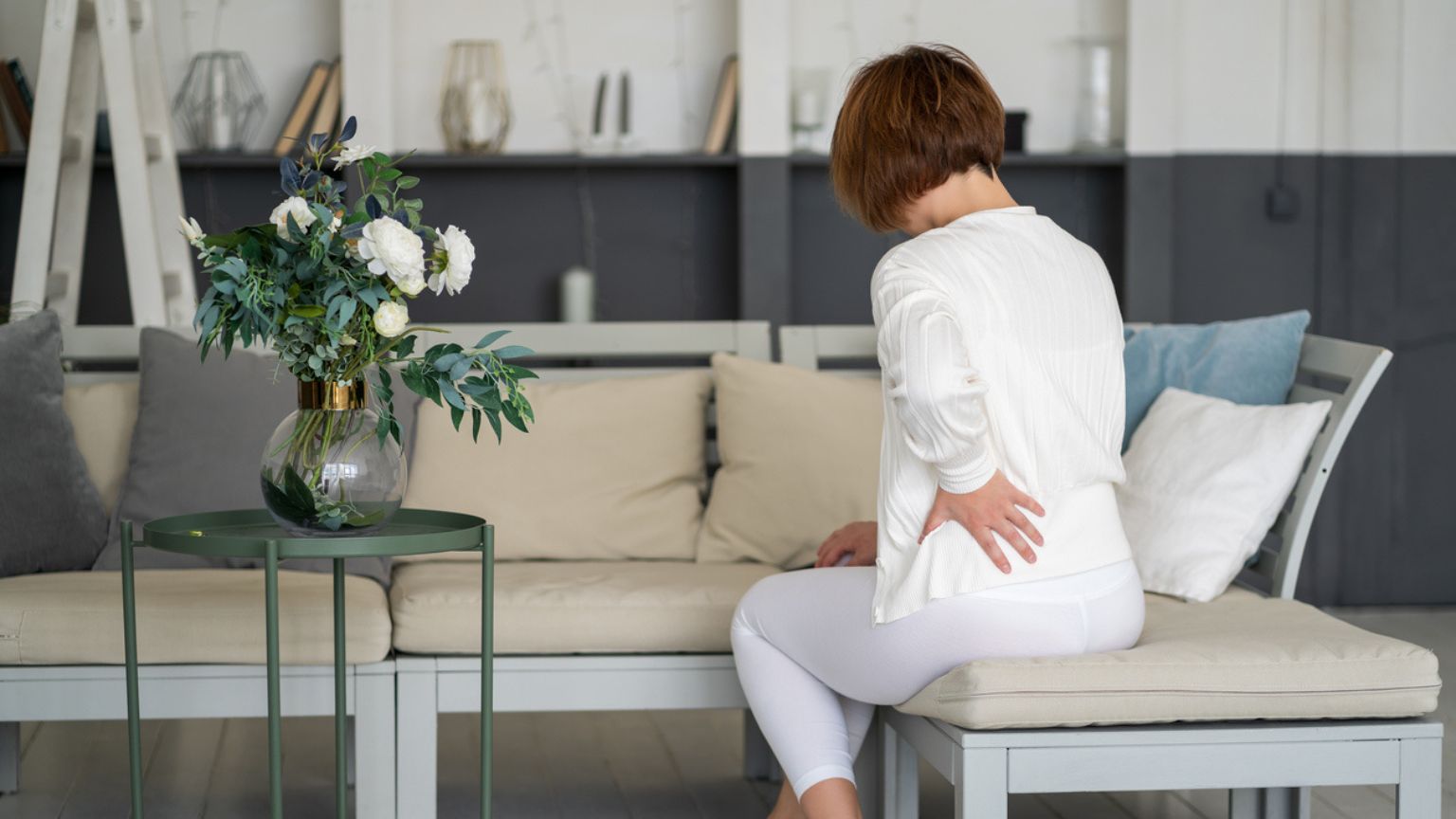Want to know how to keep your bones healthy and strong? No matter how nimble you may feel now, osteoporosis risk increases as we age
‘During childhood and adolescence bones are still developing until you reach peak bone mass in your early 20s,’ says Dr Keay, Sports and Dance Endocrinologist, Honorary Clinical Lecturer at University College London and author of Hormones, Health and Human Potential.
once you hit peak bone mass, you start to lose bone slightly more quickly than you gain it
‘This is when your bone mineral density is at its highest. When you’re young your body makes new bone faster than old bone is broken down. But, once you hit peak bone mass, you start to lose bone slightly more quickly than you gain it.
‘The higher your peak bone mass the more protection you should have against osteoporosis (weak, brittle bones) and osteopenia (when bone mineral density is lower than it should be) in later years.
READ MORE: Are you at risk of osteoporosis? 3 ways to keep your bones healthy
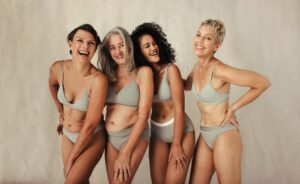
‘Factors that may disrupt hormonal function during puberty, and, at any time during your reproductive years – may include eating disorders such as anorexia, faddy diets, poor nutrition, or even over-exercising, leading to erratic or missed periods (amenorrhoea) and low oestrogen levels,’ says Dr Keay.
‘If not addressed, this may have an adverse effect on peak bone mass.
your whole skeleton is ‘recycled’ every 10 years or so
‘The good news is that bone is an active tissue and about 10 per cent of the skeleton is remodelled annually. This means your whole skeleton is ‘recycled’ every 10 years or so.
‘So, even if you weren’t that healthy as a teen, you can still improve your bone health by making healthy lifestyle changes now’.
3 signs your bones aren’t as healthy as they should be
#1 Joint pain
‘One common sign that bones aren’t as healthy as they should be is if you suffer from joint pain,’ says Mr Jonathan Miles, Consultant Orthopaedic Surgeon at The Wellington Hospital.
‘Weak painful joints are a clear sign of poor bone health. For example, a continuously sore hip, which can result in difficulty walking and causes sleepless nights is a sign that your hip may need replacing’.
READ MORE: Arthritis? Joint pain? 6 natural solutions that work
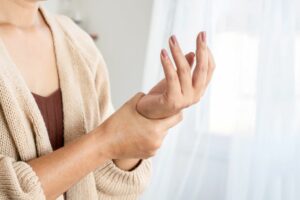
#2 You’re getting shorter
‘Everyone shrinks with age, on average by one inch due to discs between the vertebrae flattening,’ says Mr Jonathan Miles.
‘But, if you are shrinking more than this, it may be a sign of osteoporosis. This is a common bone health condition which causes weak bones that are prone to breaking. Symptoms include stooped posture and bones that break easily.
‘Women are more at risk due to the menopause when oestrogen levels drop. Before osteoporosis, many people are diagnosed with osteopenia.
Symptoms include stooped posture and bones that break easily
‘This is when bone density is lower than it should be, but not severe enough to be labelled osteoporosis. Osteopenia doesn’t always lead to osteoporosis’.
If your doctor suspects you may have osteoporosis, they will refer you for a bone density scan (DEXA).
#3 Aches and pains
‘While the occasional aches and pains are normal, if they become frequent it’s important to get checked by your doctor,’ says Mr Jonathan Miles.
‘It could be a sign of lack of vitamin D, or calcium, or an indicator of poor bone health. Lack of vitamin D causes rickets in children and osteomalacia in adults.
‘If you have darker skin, or have little exposure to sunlight, you should consider taking vitamin D supplements in the winter months’.
READ MORE: Experts reveal 5 healthy supplements you probably don’t know about but totally should
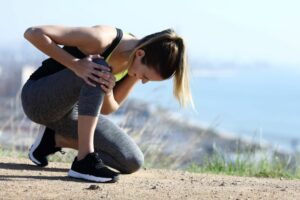
Looking after your bones in your 20s and 30s
Bone health should remain relatively stable in your 20s and 30s.
‘But, as hormones continue to influence bone health, any imbalances in lifestyle choices will have a knock-on effect,’ says Dr Keay.
‘For example, over exercising, poor nutrition, stress and not getting enough sleep can disrupt hormone networks involved in oestradiol production.
‘The good news is that pregnancy, when oestrogen levels are high, acts as a boost for bone health.
over exercising, poor nutrition, stress and not getting enough sleep can disrupt hormone networks
Exercise Regularly. Strength building and weight bearing exercise like walking, dancing, yoga and weight training (e.g.: either use hand weights or your own bodyweight all helpful for improving bone density.
Monitor your periods for any changes (e.g.: irregular, missed) as this may indicate hormonal imbalance that needs to be checked out.
Taking nutritional and herbal supplements may help with hormonal imbalances that may be causing menstrual irregularities. Essential nutrients for healthy hormones include: magnesium, zinc, selenium, essential fatty acids (e.g.: evening primrose oil, flaxseed oil), omega 3 fatty acids (e.g.: fish oils), B vitamins, antioxidants A, C and E and chromium.
Keep blood sugar levels balanced. This will help to keep hormones in balance. Eat complex carbohydrates, small amounts of protein (e.g.: chickpeas, lentils, chicken, fish, lean meat, nuts) at every meal. Avoid processed foods.
Avoid sugary soft drinks. A recent meta-analysis (Nutrition Journal 2021) has shown that consuming sweetened drinks (e.g.: colas, sodas, fizzy drinks etc) is associated with lower bone mineral density. Added sugar, phosphoric acid, caffeine and acidity may all affect bone metabolism by disturbing calcium absorption and increasing calcium excretion through urine.
Take bone boosting supplements including calcium (1000mg) vitamin D3 (at least 10mcg/400 iu).
Try: Healthspan Osteo Complete, £18.95 which contains calcium, magnesium, vitamin D3, zinc, copper and boron.
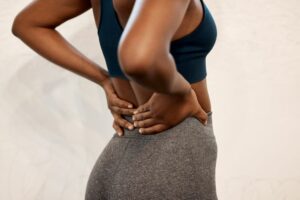
Looking after your bones in your 40s
‘By the time you get into your 40s, hormone production starts to gradually decline, including oestrogen and oestradiol, and also the growth hormone (GH), which are the key players in bone health,’ says Dr Keay.
‘This results in a 0.5 per cent annual loss in bone mass density. Your best tactic, especially, if you’re perimenopausal is to revisit your diet, exercise and sleep routine. By improving your lifestyle choices now, this will help to protect your bone health further down the line’.
Keep to a healthy weight. ‘Try to maintain a stable, healthy weight,’ says Rob Hobson, Head of Nutrition at Healthspan.
Research shows that being underweight increases the risk of osteoporosis and osteopenia (the stage of bone loss before osteoporosis).
Being overweight or obese is associated with an increased risk of fractures. Repeatedly gaining and losing weight (yo-you dieting) also appears to be linked to bone loss.
women who slept five hours or less a night had a 22 per cent higher risk of lower bone mineral density
HRT. ‘If you’re going through early menopause (40 – 45 years), you may benefit from taking hormone replacement therapy (HRT), at least until the average age of menopause, to bring hormones up and mitigate the effects of bone loss,’ says Dr Keay.
If you don’t want to go down the HRT route, consider herbal supplements such as black cohosh and red clover.
Get enough sleep. A recent study (Journal of Bone and Mineral Research, 2020) found that women who slept five hours or less a night had a 22 per cent higher risk of lower bone mineral density and a 63 per cent increased risk of developing osteoporosis of the hip than women who slept seven hours a night.
Feed your hormones for healthy bones. Eat fresh vegetables and fruit, at least five portions a day, oily fish twice a week, good quality meat, healthy fats (avocado, nuts, olive oil), seeds, full fat milk and yoghurt (or dairy substitutes). Eat protein with every meal (e.g.: quinoa, fish nuts).
READ MORE: Feeling tired all the time? Boost brain power with these 7 super supplements

Looking after your bones in your 50s
Menopause usually occurs between the ages of 45 to 55, with 51 being the average age in the UK. This is when you stop having your periods.
‘The drop in oestrogen levels after menopause means your bones no longer regenerate at the same rate,’ says Dr Keay.
‘When oestradiol declines during menopause bone mass goes down by about 5 per cent, on average, annually. This means your bones get weaker over time and this can put you at increased risk of osteoporosis and osteopenia.
Menopause usually occurs between the ages of 45 to 55, with 51 being the average age in the UK
‘It’s never too late to mitigate your risks though. You just need to be more vigilant and make sure you’re doing everything you can to optimise your bone health through diet, exercise and lifestyle’.
Herbs. If you’d rather go down the natural route, consider taking a herbal supplement that can help your body to adapt to hormonal changes during menopause.
‘When buying a herbal medicine, it is important to look for products that display the THR logo on pack,’ reveals Dr Middleton, Pharmacist and director of The British Herbal Medicines Association (www.bhma.info).
‘This logo assures that it is high quality and safe, having been approved for sale by the UK’s MHRA and therefore containing the correct herb and medicinal dose for maximum benefit’.
Should you go on HRT?
‘This is a very personal choice. HRT is usually only prescribed if you have menopausal symptoms, e.g.: hot flushes, night sweats, severe mood swings etc,’ says Dr Keay.
‘But we know that it also has a positive effect in helping to prevent osteoporosis’.
HRT isn’t an option for all women so do discuss with your GP or ask to be referred to a Menopause Clinic or find a specialist menopause, Gynaecologist.
Like this article? Sign up to our newsletter to get more articles like this delivered straight to your inbox.



